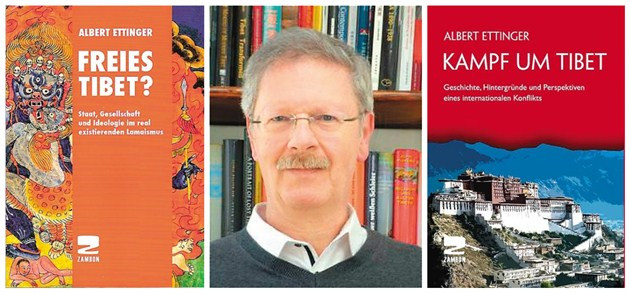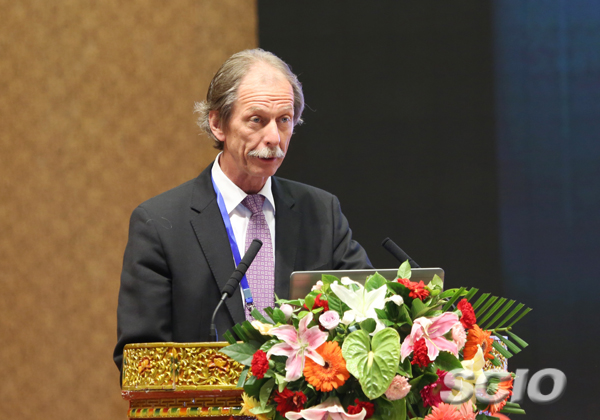Luxembourg scholar Albert Ettinger tells Tibet Stories

The old Tibet is by no means “paradise” and the new Tibet isn’t like the distorted version used by some Western people for various purposes, said Albert Ettinger, who came to Tibet for the first time this July.
Albert Ettinger, a scholar from Luxembourg, has long studied Tibet and has already published two books: Free Tibet? State, Society, and Ideology in the Real Existing Lamaism and Fight for Tibet: History, Background and Perspectives on an International Conflict.
During his research, Ettinger read about two hundred Western books on Tibet. “Historical evidence points to old Tibet having a strict hierarchy, a backwards economy and basic survival wasn't easy to come by for the people. In the 1950s the population of Tibet was less than that of the Ming Dynasty, and the average life expectancy was only 36 years.”
He said that the struggle against hunger was a regular thing for ordinary Tibet people. Ordinary farmers’ food consisted of glutinous rice cakes and butter tea, while the elite class enjoyed good food and excellent wine. “At the beginning of the 20th century, Japanese Buddhist scholar Hankou Huihai also discovered that the lives of Tibetan aristocrats and monks were very different to the lives of ordinary farmers.
Moreover, this inequality was written into Tibetan law as a system at the time. The Thirteen Codes and Sixteen Codes clearly stipulated the unequal legal status of the people in old Tibet. “If a servant injured his master, the servant’s hand or foot would be cut off and the master will hit the servant, but the master didn't have to pay compensation for medical treatment.”
It is this old Tibet that has become “the mysterious, beautiful and free Shangri-La” in some Westerners’ eyes. They also see the exiled Dalai Lama as “defender of democracy” who advocates Tibetan independence. “This is only in the context of the decline of Western Christianity, as people are trying to find a new spiritual being,” Ettinger proposes his own view on this phenomenon.
“But these people don’t understand Tibet. They just look at appearance, such as the Dalai Lama’s ‘signature’ smile and his ‘infectious’ way of treating people,” said Ettinger. "It has to be said that this is a pity."
From a small town with a tiny population, no running water and no electricity to the city it is today with lights everywhere and a wide range of modern facilities, the changes to Lhasa make Ettinger sigh with content.
“Lhasa is very different from the backwards, unhygienic city I came across in the historical materials. Today's Lhasa is clean and tidy with complete modern infrastructure. These positive changes are undeniable,” said Ettinger.
“At Lhasa’s agricultural park, I discovered people using advanced greenhouse technology to breed different crops. At a cow-breeding center in Lhasa, automatic milking equipment introduced from New Zealand helps boost productivity. The cattle fodder is bought from local farmers, which helps increase their income.” Ettinger added, “I think that what the Chinese government is doing now is helping Tibet skip a few stages of development by bringing the latest and most advanced technologies directly to Tibet. This advanced equipment and technology has led to the development of traditional agriculture in Tibet.”
Ettinger saw how traditional culture and religious beliefs are well protected in Tibet. “In the streets of Lhasa, prayer wheels and people worshipping are a common sight. In the Jokhang Temple, the Lamas debate freely about the Buddhist doctrine….”
“Lhasa’s street signs, newspapers and teachings at school are all in Tibetan and Chinese languages. The saying that the Chinese government have ‘destroyed Tibetan culture and don’t even allow studying of the Tibetan language’ is collapse of itself.
In terms of Tibet’s future, Ettinger believes that any talk of “splitting Tibet” or “Tibetan independence” is foolish. “China is developing fast and growing stronger and wealthier by the day. Tibet as a part of this great nation, will reap the rewards.”
“Tibet’s development is on the right track and with the leadership of the Chinese government, Tibet will have an even brighter future,” Ettinger said.
Your Comment
Name E-mailRelated News
-
;
-
-

-
Portray the real Tibet: German expert Markus Rudolf
“My goal is to gather as much information about Tibet as possible, ” Markus Rudolf said.
-
Based in Lhasa, Tibet Vista is a Tibet travel agency that specialized in Tibet permit, and Tibet tours for both private and group travelers at a local price!
•4 Days Lhasa City Group Tour from USD 460 •8 Days Everest Base Camp Group Tour from USD 850 •15 Days Mt.Kailash Group Tour from USD 1780 •2016 Tibet Train Tours from Beijing, Shanghai, Chengdu, Xining,etc










